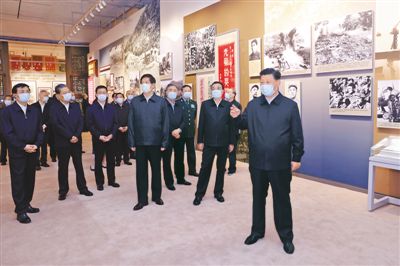(1/x) Xi Jinping& #39;s visit to China& #39;s National Military Museum to commemorate the 70th anniversary of China& #39;s military entering Korean war is a *big* deal. Totally agree w/ @niubi on this. Here are some thoughts.
(2/x) Recognize the signals here. Xi took entire membership of Politburo Standing Committee, plus Wang Qishan.
That& #39;s identical to his 2012 visit to National History Museum, used to kick off Xi& #39;s "road to revival" 复兴之路 theme so prevalent since.
https://www.chinadaily.com.cn/china/2012-11/30/content_15972687.htm">https://www.chinadaily.com.cn/china/201...
That& #39;s identical to his 2012 visit to National History Museum, used to kick off Xi& #39;s "road to revival" 复兴之路 theme so prevalent since.
https://www.chinadaily.com.cn/china/2012-11/30/content_15972687.htm">https://www.chinadaily.com.cn/china/201...
(3/x) You& #39;ve now got top-level Party imprimatur for front page news & TV stories like this @PDChina page, with the formal Chinese name for the Korean War (抗美援朝战争) [literally -War to Resist American Aggression and Aid Korea] repeated over and over.
http://paper.people.com.cn/rmrb/html/2020-10/20/nbs.D110000renmrb_01.htm">https://paper.people.com.cn/rmrb/html...
http://paper.people.com.cn/rmrb/html/2020-10/20/nbs.D110000renmrb_01.htm">https://paper.people.com.cn/rmrb/html...
(4/x) All of that spells a heavy dose of regular reminders by Chinese state media over the coming months of an era in which the U.S. and China were in open military conflict. And as @niubi and others have noted, this message is going to be repeated in film, in TV - everywhere.
(5/x) Now, it *could* be worse. @PDChina has been running a regular stream of stories on Chinese veterans of the Korea war over the past week or two, such as the following, and it is interesting what is NOT in there.
http://paper.people.com.cn/rmrb/html/2020-10/19/nw.D110000renmrb_20201019_1-04.htm">https://paper.people.com.cn/rmrb/html...
http://paper.people.com.cn/rmrb/html/2020-10/19/nw.D110000renmrb_20201019_1-04.htm">https://paper.people.com.cn/rmrb/html...
(6/x) No lurid stories of atrocities. No effort to demonize the U.S. with imaginative and flowery language. No lengthy paragraphs going into the causes of the war.
Rather, they read more like: here was a soldier who served his country bravely and came home
Rather, they read more like: here was a soldier who served his country bravely and came home
(7/x) That& #39;s interesting. Looks like someone in China& #39;s propaganda apparatus still has one foot partially on brake. If Beijing releases that, starts fanning flames more, and one can easily imagine anti-American sentiment spreading like wildfire among cadres + public.
(8/x) Despite that, there is definitely language in here that gives me the willies. Note the bit praising the museum exhibit for displaying how 全国各族人民同仇敌忾 (country and people were united in hatred against a common enemy).
(9/x) Because even if the U.S. isn& #39;t mentioned by *name*, it& #39;s pretty clear who they& #39;re talking about.
(10/x) Of course, big question is: why do all this now?
One possible (and depressing) answer: if someone in Beijing desired (or at least wanted to threaten) overt military conflict with U.S. over, say, Taiwan, they might want to signal to P.R.C. population this might be coming.
One possible (and depressing) answer: if someone in Beijing desired (or at least wanted to threaten) overt military conflict with U.S. over, say, Taiwan, they might want to signal to P.R.C. population this might be coming.
(11/x) And another (also depressing) answer: with the Party plenum opening next week, if Xi was seeking to raise himself up yet higher in the Party pantheon (Chairman Xi?) - might the threat (or reality) of military conflict help him in that pursuit?
(12/x) All the symbolism & signals being sent around the commemoration of the 70th anniversary of China& #39;s entry into the Korean War are worth watching because they are intentional signals to the Chinese public by leaders in Beijing regarding what the future might hold ...

 Read on Twitter
Read on Twitter


